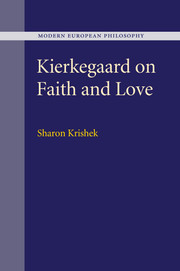6 - Faith-full romantic love
Published online by Cambridge University Press: 04 August 2010
Summary
The significance of faith-full love
The infinite love of the finite
A human being is a synthesis of the infinite and the finite, of the temporal and the eternal, of freedom and necessity, in short, a synthesis. A synthesis is a relation between two. Considered in this way, a human being is still not a self.
(SUD, 13)What does a human being need to become a self? He needs, says Kierkegaard (under the pseudonym of Anti-Climacus), something beyond the synthesis (which is the relation between the finite and the infinite, the temporal and the eternal), something other which stands in relation to this synthesis. Hence he says (at the beginning of the paragraph just quoted): ‘The self is a relation that relates itself to itself … the self is not the relation but is the relation's relating itself to itself’ (ibid.). To be a self, then, it is not enough to be a synthesis, namely, a mere relation between finitude and infinitude. Being a self is relating to this relation, knowing how to relate to ourselves in our being both finite and infinite. Being a self means knowing how to posit ourselves in the right relation to both infinitude and finitude; it is ‘the conscious synthesis of infinitude and finitude that relates itself to itself’ (SUD, 29). This self is spirit, Anti-Climacus says, and this interestingly resonates with an important definition formed by Kierkegaard (under yet another pseudonym, this time Vigilius Haufniensis) in The Concept of Anxiety.
- Type
- Chapter
- Information
- Kierkegaard on Faith and Love , pp. 166 - 189Publisher: Cambridge University PressPrint publication year: 2009

